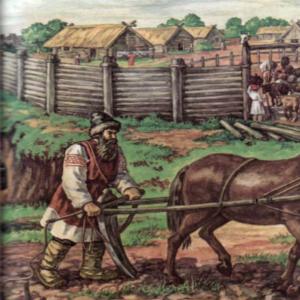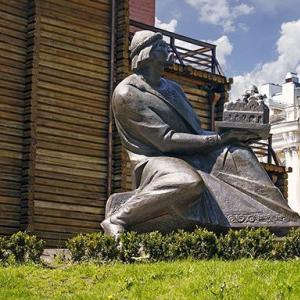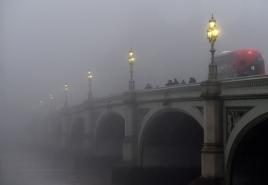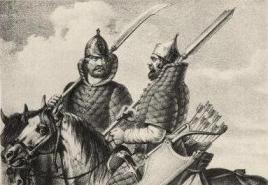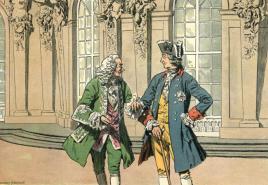How geese saved Rome (ancient Roman legend). How geese saved Rome, or zoology in history History of how geese saved Rome
I recently visited VRome- once the capital of the Roman Empire. Having looked at the Colosseum and other attractions, I visited on Capitol Hill, where I came across an unusual monument to geese. I confess that before this I had only heard the story about the rescue of Rome by geese only in passing. Now I wanted to know more.
How geese saved Roman soldiers
This story, oddly enough, does not have exact confirmation, but is based on real events. IN V century BC uh. it was in full swing confrontationtribes of Gauls and Romans. The Roman Empire had not yet been founded. From the series of comedy films about Asterix and Obelix, I knew that the Gauls had a hard time resisting Rome, and they resorted to all sorts of tricks. In the film it was a miracle potion, in reality it was often carried out ambushes and hidden raids.

At that time there were cults in Rome, one of which was cult of Juno- goddesses of marriage and birth. Her animals were considered geese and peacocks. It was geese that were kept as part of the cult on Capitol Hill. At that time, the Gauls managed to capture Rome as a result of a surprise raid, and the remnants of the Roman army took refuge from the Gauls on Capitol Hill. The situation of the Romans was terrible, they were starving and were waiting for support. Legend says that under the cover of darkness the Gauls tried to take him by surprisetired sleepy Romans, but those the geese woke me up who began to cackle loudly. The Roman soldiers woke up and were able to repel the barbarians. Thus, the geese saved the remnants of the Roman army.
Capitol Hill
Rome is founded on seven hills, one of them is Capitol. Having visited it, I saw not only the monument to geese, but also a number of beautiful historical places:

In 1875, in a book for children’s reading, L. N. Tolstoy included a story written based on the work of the Roman historian Titus Livius, “How Geese Saved Rome.” In it he gave a historical example of how in 390 BC. e. the birds helped defeat the Gauls. In fact, Rome was not saved by geese - this is just a legend, but by the brave commander Marcus Furius Camillus who defeated the Gauls, who for the expulsion of the Gauls received the title of “the second founder of Rome.” But there were geese too...
Tradition of deep antiquity
The Allian tribes, which in those distant times inhabited the north of Italy, moved towards Rome. Under the leadership of King Brennus, the Senones invaded northern Italy, then camped near the city of Clusium, friendly to the Roman Republic. Frightened residents turned to the Romans for help. Roman ambassadors tried to resolve the conflict. But Brennus replied that the Romans themselves follow in their policy “the most ancient of laws, which gives to the strong the property of the weak and to which everyone, from God to the wild beast, obeys” .
ZOO BUSINESS No. 7/2014
- Tradition of deep antiquity
- Objective reality…
- An ancient myth dispelled?
Then the Romans provoked a quarrel, in which one of the Gallic leaders died at the hands of the Roman ambassador. A clash became inevitable - Gallic and Roman troops fought near the Allia River. And July 21, 387 BC. e. Brennus inflicted a crushing defeat on the Romans, which jeopardized the very existence of Rome: the city at that time was deprived of significant fortifications and was practically defenseless. The Gauls burned and practically destroyed the Eternal City. In the middle of Rome, only the Capitol remained, where the Roman senators sat and decided the fate of the Empire. There were many pagan sanctuaries here, the memory of which remained in world history. Including the Temple of Juno, where money was minted. The insidious invaders intended to plunder it, because they knew what countless treasures were stored in this temple. The Capitol rose on a hill: on one side there were walls and gates, on the other there was a steep cliff. At night, detachments of Gauls climbed the Capitol Hill. There was silence all around: the tired defenders of the fortress and the sentries were sleeping. The guard dogs didn’t smell anything either. But suddenly a loud cackling sound was heard. This was the cry of the sacred geese at the temple of the goddess Juno, who heard the clanking of weapons. Cackling and flapping their wings, the birds made such a noise that they woke up the consul Marcus Manlius - he was the first to rush into the fight, knocked down a Gaul who appeared on the hill, and he rolled down, dragging others with him. Because of the screams of horror, other warriors also woke up. The enemies started to run. This feat made Manlius a national hero, and he rightfully began to be called Capitoline. He had many awards and was very revered among the plebs...
Since then, the Romans have treated geese with great respect and established a holiday in honor of this day. The priests walk dressed up around the city; one of them is carrying a goose, and behind him a dog is being dragged on a rope. And the people come up to the goose and bow to him and the priest: they give gifts for the geese, and they beat the dog with sticks until it dies.” And in honor of these birds a monument was erected in Rome...
However, the battle for Rome did not end with the escape of the Gauls from the Capitoline Hill. The Roman commander Marcus Furius Camillus and his army were still on the way, and in Rome negotiations had already begun between the defenders and the attackers. The reason for everything was the hunger that tormented both sides. And then the warring parties agreed that the Romans would pay off with gold and the Gauls would leave. But the Gauls brought false weights. When the townspeople began to be indignant, the leader of the Gauls, Brennus, to prove that he was right, threw a sword on the scales: "Woe to the vanquished!" - he exclaimed. It was at this moment that Camillus appeared with his army. “Rome must be defended with iron, not gold” , he said, and the final battle began, in which the enemy troops were completely defeated. For the expulsion of the Gauls, Marcus Furius Camillus received the title “Second Founder of Rome.”
If you climb the Capitoline Hill today along the steep steps of the Araceli staircase, you will find yourself in one of the most ancient and truly Roman churches - the Basilica of Santa Maria in Araceli. It is located on the site where the Temple of Juno stood in ancient Roman times. Here, in addition to the statue of the Infant Christ “Santo Bambino”, you will see those very “famous Roman geese” that were discussed in our article.
Objective reality…
We all know this amazing story from childhood. And at school, during history lessons, they told us about it, and we read Leo Tolstoy (Collected works in 22 volumes, volume 10 - author's note). But an interesting question arises: why were both the guards and the watchdogs so disgraced? Let's say the guards fell asleep. What about dogs? The picture emerges like this...
As you know, a dog’s canine hearing is unlike a human’s. Well, perhaps it is second only to the wolf: the lower limit is set precisely - from 24 m, the upper - in the process of research. Some hunters claim that in windless, calm weather their hunting dog hears game up to 150 m - apparently, depending on the breed. At the same time, it must be taken into account that far from the most deaf dogs were left in the Capitol as watchdogs...
Many of us know from our own experience that a guard chain dog begins to worry when someone approaches the protected area (the fence of the site) within 20 meters. This is provided that the smell of the “alien” is familiar to it and it does not see it enemy. You just need to give a signal to the owners - for formality. When the “guest” walks along the fence, 10 meters before the booth, such a concert begins that it can be heard at the other end of the village through the roar of the tractor, even if this Buyan or Serko was sleeping soundly in the booth.
What about geese? Here is what the irrefutable authority of the animal world Leonid Pavlovich Sabaneev says about this: “Of course, migrating geese, having been in trouble once or twice, will no longer be allowed in either in a cart or on a horse (that is, on a horse), nevertheless, despite the fact that they rarely spend more than a week on the lakes, they are killed incomparably more than native geese. The latter, in an open place, will rarely allow a hunter with a gun to come within 150 steps.” . Well, we've heard a lot about goose's excellent vision. Bird hunters confirm that wild geese have it - about two human “units”, that is, twice as sharp, and in color and with a 360-degree view. Therefore, it is very difficult to hide them, and they only land on a sure shot when you are disguised. The ability to hunt geese professionally comes, as a rule, after 10 years of hunting them. Plus, we must take into account that in the flocks of geese resting in the fields or swamps there are always experienced “duty officers”, a kind of VNOS service - aerial surveillance, warning and communications. These birds are also not deprived of hearing - they have more than excellent hearing. They hear each other on the reflective surface of the water and communicate at a distance of up to 3 km! But these are wild geese. What about the home ones? And they are also not inferior to their wild counterparts: some sources report that “their hearing is better than that of dogs, they react to the slightest rustle and cackle to warn the owner about the arrival of “guests.” Well, that's all, it seems. No questions. But...
While relaxing in the village, I did not notice that domestic geese were worried further than 10 meters from me, even walking towards me along the street. Five meters away they begin to cackle displeasedly, flapping their wings, showing dissatisfaction, and stomp away - just in case. What if they are in a barn (well, we don’t have a temple of Juno with geese in Ukraine)? A riddle... However, an explanation was found for this question in the form of observations of biologist Igor Prokhorov, in his youth a great lover of extreme sports and experiments. “When I was serving in the army, one night I went AWOL to the village, and that’s where I came across the phenomenon of geese. I walked through the backyard past a barn, and there were geese sitting there. And when I crossed some invisible line, they began to quietly make noise. I immediately stopped and stood motionless, I even stopped breathing. I thought they would calm down and I would move on. Nothing like this! They were laughing (not loudly, really) the entire time I was standing there. This interested me and I began to research this phenomenon. This is what happened. The volume of their cackling is directly proportional to the degree of approach to them, starting from a certain boundary distance. According to my estimates, this border runs at a distance of 6-7 meters. If you make any sounds at a greater distance, they do not react. But when you cross this border, they immediately raise an uproar. I didn’t get too close to the barn, because I was afraid that they would go so broke that they would raise the whole village to its feet. But I was AWOL!”... That is, domestic geese have their own safety zone, commensurate with the characteristics of each flock, but within a limit of at least 5 meters.
Beautiful legend or historical truth?
Chinese authorities urge citizens to breed more... geese. Geese patrols are especially effective in rural areas. “Geese are famous among all birds for their guarding abilities, and they are also very smart and brave, so they attack any stranger who enters the yard or house,” says Zhang Quansheng, chief of the Showan county police. Typically, families keep one or two dogs, which can be easily tranquilized or killed with poisoned bait. This trick will not work with geese, because, firstly, there are much more of them, and secondly, they see poorly in the dark and simply may not notice deadly gifts. The policeman cited a case where geese helped detain a criminal who tried to steal a motorcycle directly from the rural police department. He euthanized two police dogs, and had already climbed over the wall when he met a dozen geese in the yard. At the sight of the stranger, the birds made such a noise that they woke up the duty officer. The thief was caught at the crime scene.
Now let's move on to the Romans. Geese in Rome lived in the Temple of Juno and were sacred animals to the ancient Greek goddess of marriage, birth and motherhood. They have never been used as watchmen because of the identified pattern: they begin to cackle only when a stranger approaches them at a distance of less than 3-4 m. And the watchman must react to a much greater distance. This temple, where the geese lived, stood close to the city wall. And when the Gauls had already climbed over the walls, they were too close to the geese. So they started laughing. If the Gauls had climbed over the walls at least 15 meters from the temple, the geese would have remained silent. But even if this was the case, everyone had to wake up early, take a weapon, approach the wall... But the Gauls must already be on the wall for the geese to react to them. No, the consul Marcus Manlius, whose feat was so vividly depicted by Titus Livius, does not make it to the wall. So it's a dead end?
An ancient myth dispelled?
Not at all, because everything ingenious is simple! If you believe the primary sources, Mark’s bonus from the grateful defenders of the fortress was not gold, of which there were hundreds of kilograms in the Capitol, but an additional ration of bread and wine. The besieged Romans had been starving for a long time; leather sandals and shields made of tanned oxhide had already been used as food. Only the geese were not touched, fearing the wrath of Juno. So they went wild when one of the warriors decided to snack on a goose while their brothers in arms were fast asleep. But they slept together. The movement and long absence of a comrade could raise questions. Who automatically had a perfect alibi? The guards, because she “stood on the walls”!
Then the following picture unfolds. The hungry guards, led by the chief, set off to catch and fry the goose. The geese, sensing reprisals against their carcasses, scream so loudly that they wake up Marcus Manlius. He catches the chief of the guard at the crime scene with a goose in his hands, like Ostap Bender - Panikovsky. Shouts: “Throw the bird!” and rushes to the unguarded wall, to the most dangerous place - the secret path to the top. And - oh happiness! - makes it in time: the Romans, who jumped up from this commotion, successfully repulse the attack of the Gauls, which coincided with the goose showdown at the wrong time.
The Romans are exemplary warriors, from whom they took their example at all times - and suddenly such a passage! What will Titus Livius write next? And the chief of the guard committed sacrilege by encroaching on the temple goose, and Juno’s sacrifice is simply necessary. And so the chief of the guard was thrown into the abyss - which was recorded by historians. Thus, honor was saved, the criminal was punished, and the goddess was pleased...
Yes, historians are an interesting people after all. Livy is an authority for them, but it seems like they didn’t really respect biology from school to double-check all sorts of trifles with dogs and goose hearing.
But if you think that the research is over, you are mistaken! There are many, many other versions. And you, dear readers, probably do too?
Lilia VISHNEVSKAYA
When expressing “the geese saved Rome,” a rich imagination can picture geese who, armed with swords and shields, rise to the defense of the Eternal City. Of course, everything was not entirely like that.
The phrase “geese saved Rome” originates from the book of the Roman historian Titus Livy, “History from the Founding of the City.” In the 5th century BC. Rome was one of many cities fighting for a place under the ancient sun. Victories alternated with defeats, and once the Roman army was completely defeated by the Gaul army. The retreating Romans tried to defend the city, but the Gauls easily took the walls and the remaining defenders were forced to take refuge in the Roman Capitol - a kind of fortress-temple, which served as a meeting place for the Senate and public assemblies. The Capitol stood on a hill and was surrounded by a high wall, so it was not easy to take it. The Gauls rolled against the walls of the fortress in waves, but retreated time after time with losses. And then the barbarians decided to use a trick. For several days in a row they kept the Romans in constant tension, not moving away from the walls, but not storming them either. Finally, one night the besiegers retreated from the walls and the tired defenders immediately fell asleep. But in complete darkness, the barbarians silently crept up to the walls and began to carefully climb up, standing on each other’s shields. The first enemies had already climbed the wall, when suddenly the geese living next to the temple of Juno began honking. The Romans woke up from the noise and immediately rushed to the walls, where a fierce battle ensued. In the end, the attack of the Gauls was repulsed, and a few days later reinforcements arrived to the Romans, and the Gauls were forced to retreat. Since then, geese have been considered sacred animals in Rome, and the whole world knows about the miraculous salvation of the Eternal City.
Illustration: heritage-history.com/index.php?c=academy&s=char-dir&f=manlius
If you find an error, please highlight a piece of text and click Ctrl+Enter.
How geese saved Rome
The real disaster for Rome was the invasion of the wild tribe of Gauls. They say that it crossed the Alps, attracted by the sweetness of Italian fruits and especially by wine, a pleasure previously unknown to them. The Romans first heard about them from the inhabitants of Clusium, when they turned to the Eternal City for help. Hordes of Gauls were approaching Clusium, and, seeing how numerous the enemies were and how large they were, the Clusians asked for help in Rome, although they were not bound by any allied or any other treaties. The Senate decided not to give military aid to Clusius, but to send ambassadors to the Gauls to try to resolve the matter peacefully, and most importantly, to see the mysterious Gauls with their own eyes.
Three noble young men arrived as ambassadors to the Gauls, and on behalf of the entire city they demanded not to attack their friends, who had not caused any offense to the Gauls. They proclaimed the sincere desire of Rome to get acquainted with the Gauls in peaceful silence, but promised, if necessary, to defend the Clusians with arms in hand. The Gauls replied that this was the first time they had heard of Rome, but apparently this city was indeed rich and famous if the Clusians ran to its inhabitants for help. The Gauls themselves were ready to abandon the war if Clusius ceded to them part of the arable land that the Gauls needed, and they had one right to this land - the right of arms. The Romans could not agree to these outrageous demands, and a quarrel ensued, which resulted in a big battle.
The Romans in that battle fought on the side of the Clusians, which offended their status as peaceful ambassadors and damaged the honor of Rome, especially since in the battle one of the young men personally pierced the Gallic leader with a spear. Offended by the violation of customs, the new leader of the Gauls, named Brennus, abandoned the siege of Clusium and moved straight to Rome. At the sight of the noisy army of the Gauls, the peasants fled in fear, and the townspeople grabbed their weapons, while the Gauls notified those they met that they had nothing to fear, for they had one goal - Rome.
Amazed by the swiftness of the Gauls, the Romans barely had time to field a hastily assembled army, which the Gauls defeated with such ease that Brennus did not believe his victory for a long time. Finally, the surprised Gauls collected armor from the fallen and at sunset approached the Eternal City, and the Romans who survived the battle retreated to the destroyed Veii. In Rome, there was a cry: there were not enough defenders left in the city to repel the invasion of the Gauls. Finally, reluctantly, they made a difficult decision: all the strong young men and younger senators, having collected food, took refuge with their families in the Capitoline fortress, where they planned to hold a siege, because this was the only way to save the gods and the honor of Rome from the enemy.
The plebeians did not have enough space on the small Capitol, and they fled disorganized from the city to the Janiculum, from where they scattered throughout the surrounding villages. Rome was deserted: only old people remained, former consuls and triumphants, too weak to defend themselves in the fortress, too proud to flee, and who wished to perish along with their fatherland.
In 390 BC. e. The Gauls entered a deserted city, where life, at first glance, glimmered only on the Capitol. Confused, they wandered the streets, huddling in groups, as if they were afraid of an ambush. With trepidation they entered the open doors, reverently looked at the old men sitting on the thresholds in formal clothes, with faces too stern for mortals. Unable to bear it, one of the Gauls stroked the old man’s beard, and he indignantly hit him with a staff. Here the stupor seemed to fall from the Gauls: they began to slaughter the few people they met, carried out looted wealth from their houses, and soon Rome burst into flames.
Looting and arson continued for several days. The defenders looked helplessly from the Capitol at the death of the fatherland, unable to stop the enemy. The Gauls, having fought enough against just houses, decided to take the Capitol by storm, but the steep slopes of the hill and the rage of the defenders did not allow them to do this. Then the leader of the Gauls, Brennus, divided the army: he left some to besiege the Capitol, and sent others around for food, which was running out in the plundered city.
As fate would have it, one of the Gallic troops searching for bread was spotted near Ardea, where the former dictator Camillus, who had fallen into disgrace and was expelled from Rome, lived at that time. The Ardeans, frightened by the appearance of the Gauls, gathered for a council, and Camillus, who had never previously taken part in the life of the city, decided to speak to the citizens.
“I have seen only good things from you, Ardeans,” said Camillus, “and now I want to repay everything. Previously, in wars, I was known as invincible, so take up arms and I will lead you into battle. The wild Gauls do not know order, and as soon as the sun sets, they fall to sleep without posting a guard. At night they are helpless, like children. And if we do not slaughter the Gauls like cattle, then let them do to me in Ardea the same as they did in Rome!”
Brenn and his share of the spoils. Artist P. Yamin
The Ardeans believed Camillus. As soon as night fell, an armed detachment left the city and found the Gauls sleeping on the river bank. With a battle cry, the Ardeans rushed to kill the unarmed and sleepy. This terrible massacre, which cannot even be called a battle, forced the miraculously surviving Gauls to flee from Ardea in disarray.
Meanwhile, everything was quiet in Rome. Only one event amazed both the besieged and the besieged: it was customary for the Fabian family to make sacrifices on the Quirinal Hill, and so, when the time came, a young man from the Fabian family, who was among the defenders of the fortress, descended from the Capitol with sacred utensils in his hands. The Gallic sentries sternly called out to the insolent man, but he walked past them without changing his face. The embarrassed Gauls let him pass, and he, having performed the ritual, just as stern and strict in appearance, returned back. Struck, presumably, by his incomparable endurance, the Gauls allowed the young man to ascend unharmed to the fortress.
The remnants of the Roman army, who had camped in Veii, heard about Camillus’s daring attack and wanted to call him from Ardea. However, no matter how tragic the situation in Rome was, the army could not return Camillus from exile without the approval of the Senate. With a request to the Senate, a brave spy went to Rome, who, wrapped in tree bark, entered the Tiber and was washed to the Roman shore by its current. There, having climbed the coastal cliff, the spy entered the fortress and received permission from the Senate to proclaim Camillus dictator. The soldiers went after Camillus and soon brought him to Veii.
While this matter continued, the fortress was in great danger. The Gauls were able to see the tracks where the scout from Wei had passed, and so they found a path to the top of the hill. Under cover of darkness, the Gauls crept up to the fortress. Where the climb was too steep, they leaned on each other and passed weapons, managing to get up so quietly that neither people nor even dogs could hear them. And the Gauls would probably have been able to capture the sleeping fortress if not for the sacred geese from the temple of Juno. Only great respect for the goddess did not allow the hungry defenders to eat these geese, and Juno repaid the city for its piety: hearing the Gauls, the geese cackled and flapped their wings, and from the noise of this, Marcus Manlius, the famous warrior, woke up.
Grabbing his weapon and raising his comrades with a shout, he rushed forward and knocked down the first of the Gauls from the top - he flew down, knocking down others. So Marcus Manlius won several fateful moments, and then the other Romans arrived in time. With stones and arrows they threw the Gauls off the hill and thereby thwarted their attack. For Marcus Manlius, for saving the fortress, each of the soldiers the next morning brought half a pound of spelled and a quart of wine - a gift that was ridiculous in comparison with his feat, but priceless in the fortress, where famine was already beginning.
Over time, hunger and disease began to torment not only the Romans, but also the Gauls, and since the army from Wei still did not arrive, they began to negotiate. The Gauls insisted that the fortress would still surrender due to hunger. The angry Romans began to throw bread at the enemy guards, refuting these words, but the days passed, and soon the hunger became impossible to hide. Finally they negotiated a ransom, for which the Gauls agreed to lift the siege. The Gaul leader Brennus valued the Roman people at a thousand pounds of gold, but when they began to weigh them, they discovered that the Gallic weights were fake. The Romans, outraged by the meanness of Brenn, began to argue, and he, mocking, said the famous: “Woe to the vanquished!” - and in addition threw his own sword onto the scales, knowing that the Romans had no choice but to starve to death.
However, this humiliation was not destined to be the last word in the war. Even before this monstrous ransom was paid, troops led by a dictator approached Rome. Seeing the desperation of the besieged, Camill ordered the gold to be taken away and the Gallic ambassadors to be escorted out, and the defenders of the city to form up for battle. The discouraged Gauls also took up arms, but their fighting rage, thanks to which they usually won, was crushed by the training and iron discipline of the Romans: in the very first battle the Gauls were defeated, and then they captured their camp and slaughtered every last one, so that there was no one to even tell to their fellow tribesmen about that defeat.
Camill returned to Rome in triumph, and the soldiers following his chariot called him the second founder of the city. Inquisitive minds have more than once since then brought to the court of history the question of who really saved the Eternal City: the sacred geese of Juno, the military art of Mark Furius Camillus, or the selfless courage of the defenders of the fortress.
This text is an introductory fragment. From the book Leader of the Engs by Etlar KaritABOUT HOW ENEMIES SAVED SVEN, AND FRIENDS BETRAYED HIM While the described conversation was taking place in Sven’s hut, a man crawled over the earthen rampart surrounding Jungshoved Castle. It was Sven. After sunset it became very frosty, the sentry hid from the cold in
From the book Walking to the Cold Seas author Burlak Vadim NikolaevichGeese flew in from the Arctic. There are many kind eccentrics in the world. And thank God! Without them, like without jokes, without songs, without funny pranks and amusements, life would be dull. And many years of travel convinced me that they are necessary even on serious and dangerous journeys. Sometimes in
From the book Who's Who in World History author Sitnikov Vitaly Pavlovich From the book The English Roots of German Fascism author Sarkisyants Manuel1938: How the British saved Hitler from the Prussian generals This is what happened: by maintaining peace, we saved Hitler. Sir Neville Henderson By the same imperial British “logic”, according to which the Czechs themselves were to blame for the evil fate that befell them, for the imperial British and
From the book Secrets of War by Cartier RaymondX II. How Italian sailors saved Suez One of Hitler's main mistakes was an overestimation - and a terrible overestimation - of Italy. In the depths of this misconception lay the Fuhrer's personal attachment to the Duce. In sketching the portrait of Hitler in the first chapter, I tried to show the character and strength
From the book Two Faces of the East [Impressions and reflections from eleven years of work in China and seven years in Japan] author Ovchinnikov Vsevolod VladimirovichThirteen monks saved the emperor One of the monastery frescoes tells how thirteen local monks saved Li Shimin, the future founder of the famous Tang dynasty. The usurper captured Li Shimin and kept him prisoner in Luoyang. Thanks to ownership
From the book of the Strogonovs. 500 years of birth. Only kings are higher author Kuznetsov Sergey OlegovichChapter 17 “The children were not saved, but the horses were saved” The pilots have such a concept - “point of no return.” For an airplane in flight, this is a situation when the crew on board realizes that there is no longer enough fuel to return or fly to an alternate airfield. The car is lost.
From the book Confronting the Fuhrer. The tragedy of the head of the German General Staff. 1933-1944 author Förster Wolfgang“You saved the German people” A curtain of terror and conformism has fallen over Germany, but no one wants to admit it. People who have been in camps and prisons are also silent, but their faces cannot hide the traces of the horror that they experienced. Former prisoners open their mouths only for
From the book Wild Wormwood author Solodar CaesarTHE NAZI EXECUTIONER WAS SAVED BY THE ZIONISTS On May 18, 1945, Austrian partisans in Weissenbach arrested Becher and handed him over to the American Troops Task Force No. 801 SK. A suitcase and a large box were taken from the arrested person. They found a lot of valuables and currency in the suitcase, and the box was
From the book Wild Wormwood author Solodar CaesarPRISONERS OF THE GHETTO WERE SAVED BY SOVIET WARRIORS But who actually rescued hundreds of thousands of Hungarian Jews from the hands of the Nazis and saved them from death? By glorifying “saviors” of the Kastnerian type, modern international Zionism is trying in every possible way to hide the truth. It can't
From the book Wild Wormwood author Solodar Caesar"ASK EARLIER - HOW MANY WE HAVE SAVED!" With its characteristic slanderous interpretation, international Zionism celebrated the 40th anniversary of the Victory over Nazi fascism. Numerous “historical researches” were aimed at ensuring that, at the behest of the organizers of the anti-Soviet
From the book The Road Home author Zhikarentsev Vladimir Vasilievich From the book How the Catholic Church Created Western Civilization by Woods ThomasChapter 3 How the Monks Saved Civilization Monks played a key role in the development of Western civilization. However, at the very beginning of the existence of Catholic monasticism, it was hardly possible to predict the enormous influence it would have on the outside world. But this historical fact
From the book Secrets of War by Cartier RaymondX II. How Italian sailors saved Suez One of Hitler's main mistakes was an overestimation - and a terrible overestimation - of Italy. At the heart of this misconception lay the Fuhrer's personal attachment to the Duce. In sketching the portrait of Hitler in the first chapter, I tried to show the character and strength
From the book NILI - a faithful Israeli will not tell a lie by Golan AviezerSHIPS THAT WERE NOT RESCUE IN Cairo Aron sensed something was wrong. He didn't know what happened, but decided it was time to save those who were still possible. Due to his authority with the British, he receives not one, but two ships for the voyage to the shores of Atlit. He was promised that in the event of a critical situation,
From the book Russian Explorers - the Glory and Pride of Rus' author Glazyrin Maxim YurievichGaiter. Revolt of the Deutsch (“Germans”) against Gusya According to one version of the chronicle, on the site of Retra there is Prilivets (“Prielwitz”), later a Saxon fortress. Retra stood on nine hills. From Hamburg to Retra 20 miles. Previously, the water level was 2-3 human heights higher and the hills
The annalistic records of ancient Roman historians largely form the basis of our knowledge about that distant period when the great one grew and flourished. And it is generally accepted that Roman legends (as well as Greek ones) do not lie. But is it worth blindly trusting such sources? After all, at all times there have been cases when people tried to cover up their own negligence with absurd stories. And the chroniclers, like all other people, relied heavily on eyewitness accounts rather than verified facts. A striking example of this is the legend of how geese saved Rome.
They have been talking about this miraculous salvation since 390 BC. Because of the sensitivity of the goose tribe, the warlike Gauls were unable to secretly capture the Capitol, where the besieged defenders of the Eternal City were locked.
As the great Roman historian Titus Livy later wrote, the Gauls found a secret path along which they climbed to the top of the Capitol and were able to climb the walls of the fortified Kremlin. Exhausted by hunger and fatigue, the Roman warriors slept soundly. We didn’t even hear the enemies creeping up in the darkness.
But the Romans were lucky. Very close to the place where the attackers approached, right next to the fortress wall, there was a temple in which its sacred birds, geese, lived. Despite the famine that raged among the besieged, the temple geese remained untouchable. They sensed trouble. They screamed and flapped their wings. The guards, awakened by the noise, and the resting warriors who came to her aid managed to repel the attack. Since then they say that the geese saved Rome.

More than 1000 years have passed since then. But its inhabitants remember how geese saved Rome. In honor of this event, a holiday is organized in Rome to this day, during which all the people honor the savior goose and kill the dog, guilty only of its belonging to the canine family. The catchphrase about how geese saved Rome has entered all the languages of the world. They say this when they want to talk about a happy accident that saved them from a huge disaster.
But zoologists have serious doubts about this historical fact. After all, no matter how exhausted the dog is, no matter how soundly she sleeps, her hearing and sense of smell are working. A trained guard dog (namely, these were kept in the service of the Romans) could not miss the approach of the enemy. The dog should have smelled and heard the Gauls sneaking in the dark at a distance of about 80 m. Even if we assume maximum values, the four-legged guard should have raised the alarm when the enemy approached a distance of 20-25 m. If in doubt, try to discreetly approach an unfamiliar sleeping dog. And see for yourself.
And now - about the abilities of geese. Geese have never been used as guards. And this is not surprising. Because their main “guard” organ, like other birds, is acute vision. Geese cannot hear or sense the approach of a stranger at a considerable distance. Only at a distance of 3-4 m, geese, even being behind a solid wall, somehow sense the approach of a person and show signs of alarm. But this is not noisy behavior that can wake up soundly sleeping soldiers, but only dissatisfied quiet cackling. Unless the threat is directly approaching.
So how did geese save Rome? After all, it turns out that this legend openly contradicts the laws of zoology. But this story caused so much noise in its time that it is difficult to admit a lie on the part of the respected Roman chronicler. We can only guess how events unfolded in reality. Perhaps the geese woke up not from the approach of enemies, but from the fact that the hungry guards decided to secretly feast on the sacred bird from everyone. Well, the gods wanted this sin to become salvation for the city. Another option: at that time there were simply no dogs left in the city. After all, they were not counted, and the inhabitants were so hungry that the leather of sandals and shields was already used for food. And finally, version three. Perhaps the most far-fetched. However, it is possible to assume that Titus Livy and after him all of humanity allegorically called the bribed traitor guards “dogs”, and “geese” - one of the Gaulish (Celtic) warriors who warned the consul Marcus Manlius about the attack and betrayal . After all, it was for them that the goose was a sacred bird from time immemorial. But neither pride nor tactical considerations allowed the Romans to openly admit this fact.

We will never know how everything really happened. But the geese forever retained the glory of being the great saviors on the seven hills.









